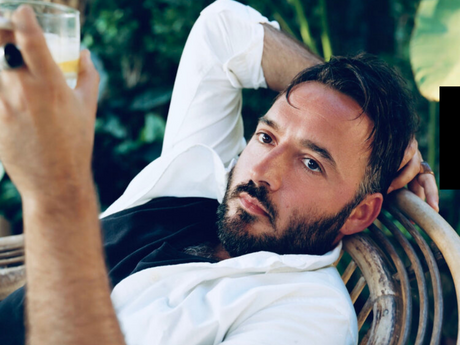In Their Own Words
Angelo Nikolopoulos on “Hermoupolis Port: Departure Scene”

Hermoupolis Port: Departure Scene
After fucking bareback at Diogenis Hotel
I stand before a gold icon, El Greco’s Dormition of the Virgin,
in a cathedral of the same name.
The Dormition is the belief
that when the Virgin Mary passed from this earth
she didn’t die but slept until her soul
and body were taken up to heaven and reunited.
Unwashed, I feel the wetness inside my asshole loosening.
It is both part of myself and outside myself.
A radiating aftermath, like a welt.
I will soon walk to port and onto a ferry, bound for Athens.
And I will carry it with me.
Reprinted from Pleasure (Four Way Books, 2022). All rights reserved.
Ten Notes on Hermoupolis Port: Departure Scene
1. “Hermoupolis Port: Departure Scene” is the final poem in my book PLEASURE, and it begins with fucking.
2. The first poem in the book, “Hermoupolis Port: Arrival Scene,” does not contain any fucking but features a “handsome priest (trim beard, silver hair)” straddling a motorcycle on the Greek island Syros.
3. The book begins in early July and ends in mid-August, and by book I mean: an archive of things that happened to me one summer, the summer I tried to be alone.
4. Perhaps the poem doesn’t begin with fucking; it began with me standing in front of a 16th century icon, The Dormition of the Virgin Mary, with after-fuck dripping down my thigh, contemplating—
5. Why does the Virgin Mary’s soul reunite with her body after death? And why does Thomas the Apostle, arriving on a cloud to behold her celestial transition, ask: Where are you going, O Holy One?
6. To which the Virgin Mary, removing her girdle and handing it to him, responds: Receive this, my friend.
7. The poem doesn’t contain the fucking because poems can never contain the fucking. The poem transforms the terrestrial (narrative) into the celestial (lyric), wherein both require and beautify the other (a poetics of transubstantiation).
8. Why else would the Holy One retain her body, if not to carry with it her sorrows and pleasures and earthbound echoes?
9. The book doesn’t end with fucking, then. The final poem begins in the echo-fuck of an encounter, narratively framed within time and place: mid-August, Diogenis Hotel, page 70.
10. The poem is a relic of something that was once alive. And a like a fig or a memory or a virus, it is something you can carry with you.



